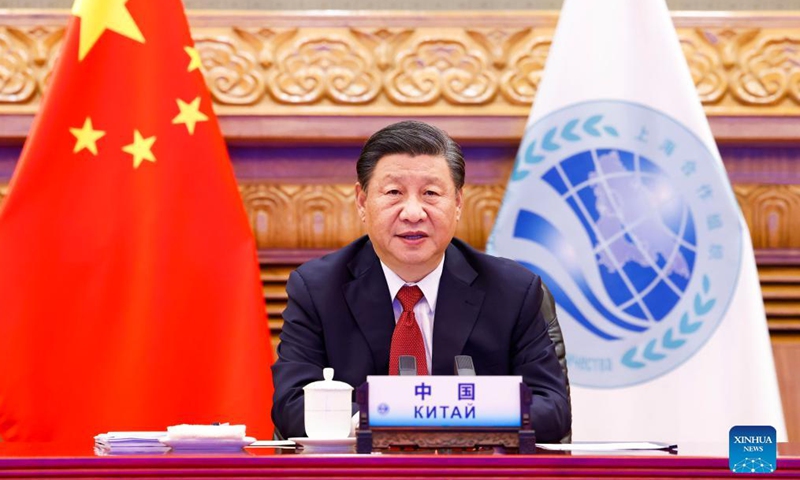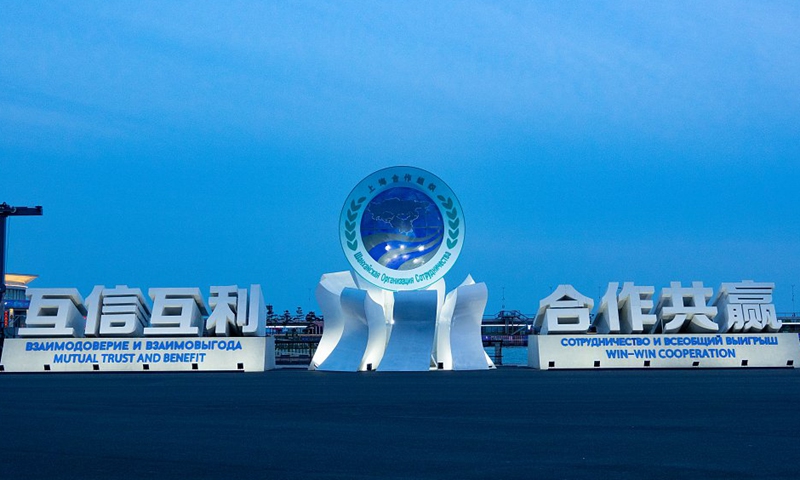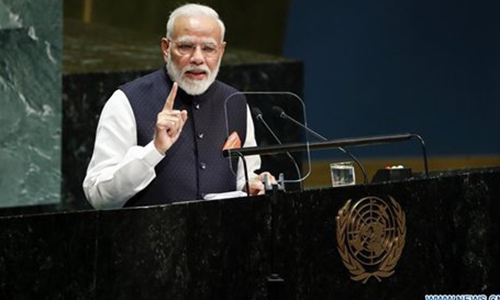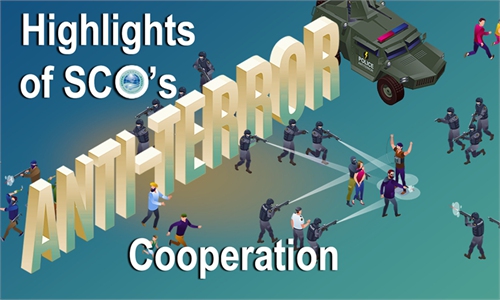SCO opposes external meddling, builds shield against outside forces
Bloc builds shield against outside forces, defends regional peace

Chinese President Xi Jinping addresses the 21st meeting of the Council of Heads of State of the Shanghai Cooperation Organization (SCO) via video link in Beijing, capital of China, Sep 17, 2021.Photo:Xinhua
Upholding the Shanghai Spirit, member states of the Shanghai Cooperation Organization (SCO) vowed in a declaration released on Friday to build a community of shared future and oppose interference from outside forces under the excuse of counter-terrorism and human rights, which experts said that after 20 years of development, the SCO has built a shield against outside forces' destructive interference and played a more important role in defending regional peace.
The 21st Meeting of the Council of Heads of State of the SCO was held on Friday with leaders of member states attending by video link and in-person in Dushanbe, the capital city of Tajikistan, as it holds the SCO presidency this year, which marks the 20th anniversary of the organization's establishment.
Soon after the summit, the member states of the SCO signed the Dushanbe Declaration, in which they stressed opposition to interference under the excuse of counter-terrorism or human rights, or to solve key international and regional issues through small cliques, ideology or confrontation mentality. They also agreed on strengthening cooperation in cracking down on terrorism, extremism and separatism and reached a consensus in supporting building an inclusive government in Afghanistan.
When addressing the summit, Chinese President Xi Jinping said that over the past two decades, guided by the Shanghai Spirit of mutual trust, mutual benefit, equality, consultation, respect for diversity of civilizations and pursuit of common development, the SCO has endeavored to promote world peace, development and human progress, and to explore new ground with a view to building a new type of international relations and a community with a shared future for mankind.
President Xi called state members to follow the journey of enhancing solidarity and cooperation and "keep the future of our countries' development and progress firmly in our own hands."
"We should maintain firm confidence in our systems, reject condescending lecturing, and firmly support countries in exploring development paths and governance models that are compatible with their national conditions," Xi said, noting that "we must never allow any external interference in the domestic affairs of countries in our region under whatever pretext."
After 20 years of development, the SCO has become a solid shield for state members to adhere to independent development and to resist destructive interference from outside forces, Li Haidong, a professor at the Institute of International Relations of the China Foreign Affairs University, told the Global Times.
The inclusive Shanghai Spirit has made a sharp comparison to the small cliques led by the US and "the reasons why we are stressing the spirit is that the US and its allies keep sowing disturbance and making mess globally by willfully interfering in other countries' domestic affairs," Li said.
Li noted that the SCO focuses on defending common interests of member states in the global changes. It also shoulders the responsibility of ensuring the international order being evolved with justice and fairness that fits the interests of the majority of countries and is not affected by a certain country with a Cold War mentality.
Zhu Weilie, director of the Middle East Studies Institute at Shanghai International Studies University, told the Global Times that President Xi's speech highlighted SCO members' unanimous voice of resolutely opposing outside forces to interfere in the affairs of the region no matter in what excuses.
Against the backdrop of US interference and provocation, the Afghan issue and expansion of the membership, the future SCO cooperation will highlight solidarity and unity, Zhu said.
Member states should jointly resist US provocation and should better manage the disputes between member states, as India has to take practical moves to ease and manage disputes with Pakistan and China, he said.
The SCO, established 20 years ago to initially focus on regional security affairs, now sees its teamwork covering various fields. The organization was first expanded in 2017 when India and Pakistan joined as full members. Along with its six founding members - China, Kazakhstan, Kyrgyzstan, Russia, Tajikistan, and Uzbekistan, the bloc has eight full members, four observer countries and six dialogue partners.
On Friday, the SCO also launched procedures to admit Iran as a member of the SCO and Saudi Arabia, Egypt and Qatar as new dialogue partners. And experts said that the expanded SCO will better help safeguard regional security.
Zhu told the Global Times that Iran will probably become one of the most influential outside players for Afghanistan, considering Iran and Pakistan host the most Afghan refugees and asylum seekers.
After joining the SCO, Iran will have more cooperation in intelligence sharing and coordinated operations with other member countries. This will be a powerful restraint to the possible spillover of extremists in the future situation of Afghanistan, experts said.
Experts also believed that against the backdrop of China-US and Russia-US confrontations, it will be a trend for China, Russia and Iran to strengthen their unity, and they said the solidarity of the three countries, particularly cooperation through the SCO platform, will be a counterbalance or deterrence to the US.

Photo:VCG
Regional peace
Regional security and counter-terrorism also topped the SCO agenda. The SCO is an important platform as Afghanistan is an SCO observer state and shares borders with several member states.
In the Dushanbe Declaration, state members believe that to coordinate the situation in Afghanistan is one of the important factors to safeguard regional peace and stability. The state members support Afghanistan to become an independent, neutral, united, democratic and peaceful country and to eliminate terrorism, wars and drugs. It is also very important to build an inclusive government engaged with all ethnic groups, religious and political forces, according to the declaration.
On the same day, Xi also participated by video link in a joint summit of the leaders of the SCO and the Collective Security Treaty Organization member states on the Afghanistan issue.
Xi said that member states of the SCO and the CSTO are all in the vicinity of Afghanistan and are within a community with a shared future and shared security. These countries should work together to play their role at a crucial time to defend peace and stability that is more precious than gold.
The SCO members on Friday also agreed to urge Afghanistan to firmly crack down on all terrorist groups, and President Xi said that relevant parties in Afghanistan should be urged to resolutely crack down on and eradicate terrorist organizations in the Afghan territory and prevent terrorist forces in Afghanistan from wreaking havoc.
Xi also called on SCO members to take tough action against terrorism, separatism and extremism, including the "East Turkistan Islamic Movement (ETIM)."
Zhu said that the Taliban government has promised that it will ensure no terrorist groups will use Afghanistan to threaten the security of neighboring countries, but the promise itself is not enough.
"After the new government was officially established, Afghanistan should come up with a blacklist of all terrorist groups it will eliminate, including the ETIM," Zhu said.
The Afghan issue was an urgent and significant challenge for all SCO members and the SCO is likely to establish a special mechanism on Afghanistan's reconstruction, which will be a long-term platform for countries to discuss detailed plans on how to help and guide Afghanistan, Zhu said.
"Meeting on Afghanistan should not be organized by US-led Western countries, which is based on US-proposed 'rules' rather than the UN charter, and the US' credibility and influence has fallen into a record-low after its withdrawal from Afghanistan," Zhu said, noting that the Afghan issue should be discussed under the framework of the UN or by neighboring countries of Afghanistan.
After pulling out of Afghanistan, the US' military presence in Central Asia is zero. Member states of the CSTO and SCO do not want the US to stir up trouble in the region and Russia and CSTO members will also not allow the US' military strength to return to Central Asia, Zhu Yongbiao, director of the Center for Afghanistan Studies in Lanzhou University, told the Global Times.
Zhu added that US willingness and capability to have military interference in the area would decline.


